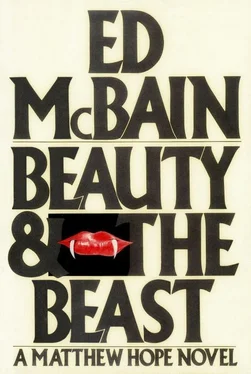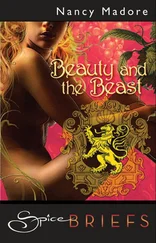“Neat person,” Bloom said.
“Yes,” I said.
“So why does he go around leaving his fingerprints all over the place?”
On a shelf over the workbench was an assortment of lidded jars in various sizes, separately containing nails of different weights, screws of different lengths, washers, nuts, bolts, latches, and hinges. A second shelf contained a can of turpentine, several cans of paint and varnish — and an empty space that could have accommodated a five-gallon can of gasoline. A power lawn mower, looking oiled and spotlessly clean, not a blade of grass clinging to its cutting edges, stood against the wall near the workbench. And alongside that, a tarpaulin covered something angled in against the wall. Bloom lifted the tarpaulin.
We were looking at a stack of oil paintings. The one in the forefront of the stack was a Sally Owen original, unmistakable in style. The content, however, was somewhat startling. The painting depicted a black man and a white woman in passionate embrace. Bloom and I looked at each other. The unframed canvas behind it was another oil, a crude portrait copied from Rembrandt’s The Man with the Golden Helmet . Behind that was a painting of a fishing skiff. And behind that what was supposed to be a glorious sunset. Only the first canvas seemed to have been painted by Sally; the others were in varying, equally lousy styles, but definitely not hers, not from her distinctive hand.
“Think it’s supposed to be Harper and his wife?” Bloom asked.
“Doesn’t look much like them.”
“Doesn’t look much like anyone ,” Bloom said. “Just a black guy kissing a white woman.”
“Maybe he bought it for her,” I said.
“Or maybe it was a gift from the artist ,” Bloom said, emphasizing the word so that it became a critical judgment.
He replaced the tarpaulin, and we went out of the garage and into the backyard. Lumber piled in orderly stacks, by length and width. Three chairs painted green, standing side by side against the back wall of the garage. A pair of stripped-down chairs beside them. Four ladders leaning against the wall, one against the other. A bathtub, and alongside it a ceramic washbasin in a matching shade of blue.
“You sometimes get these big guys,” Bloom said, “they’re very neat people, like fat guys who are light on their feet, you know? My uncle Max, may he rest in peace, he must’ve weighed three hundred pounds, but he was as delicate as a butterfly, I mean it. Organized? Like a clock. A place for everything, and everything in its place. Gentle, too. A very gentle person.”
“Harper’s been described that way to me.”
“By who?”
“A friend of his. Sally’s former husband.”
“Oh?”
“Said it would pain Harper to take a hook out of a fish’s mouth.”
“But not to set fire to somebody, huh? Or to bash in somebody else’s skull.”
“You’re changing your tune again,” I said.
“I’m only trying to understand it,” Bloom said gently. “Are we finished here?”
“One thing,” I said.
“What’s that?”
“Will you have your people look for a spare key outside the house someplace?”
“First thing in the morning,” Bloom said.
A police car picked me up at the office at a quarter past five, and we drove over to Channel 36, Calusa’s own WSWF. The news team’s anchorman told me I would have to be made up before I went on. I told him I had once read an interview with Alfred Hitchcock in which the master, in talking about actors, had said something like, “How can anyone respect a person who makes a living by putting makeup on his face?” The anchorman did not find this amusing or informative. He said I would have to wear makeup because if I didn’t then the rest of the team would, by comparison, look as if they were wearing makeup. I failed to understand his logic, but I followed him nonetheless into a small room where a rotund little lady wearing a smeared blue smock was standing behind a seated blonde, whom I recognized as WSWF’s Weather Lady, brushing out her hair.
“Are you the guest?” she asked me.
“Yes,” I said.
“You’ll need a little touch-up around the eyes and beard line,” she said, judging me from where she stood.
I had not shaved since seven that morning, Puerto Vallarta time. In the mirror lined with small electric light bulbs, I looked like Richard Nixon about to face the nation.
“Okay, dearie,” the makeup woman said to the blonde, who leaned forward closer to the mirror, touched her forefinger to the corner of her mouth, delicately dabbed at something invisible there, and then got out of the chair. She smiled at me as she went out of the room; I guessed there would be blue skies tomorrow. I took her vacant chair.
“This is pancake,” the makeup lady said. “It’ll wash right off later.” I went on the air at 6:21 P.M. after the Weather Lady reported that tomorrow would be rainy and cold, and before the sportscaster, waiting in the wings, gave the news on Calusa’s local teams. The anchorman introduced me. I looked directly into the camera and said, “I’m addressing this to George Harper. George, this is Matthew Hope. If you’re watching this somewhere, I want you to listen very carefully. I still believe strongly in your innocence, and I’ll do everything I possibly can to prove that to a jury when the time comes. I want you to call me, George. I’m in the Calusa phone book, call me either at home or at my office, that’s Summerville and Hope on Heron Street. I want to talk to you, George. It’s important that we talk. Please call me. Thank you.”
I felt like a horse’s ass.
I did not get home from Tampa, where I’d taped essentially the same message for a potentially wider audience, until almost 10:00 P.M. I was exhausted. I mixed myself a very strong Beefeater martini, dropped two olives into the glass, and walked into the study, where I turned on my answering machine. The first message was from Jim Willoughby.
“Matthew,” he said, “I don’t know why the hell you went on television, but I hope the state’s attorney doesn’t ask for a change of venue after hearing you proclaim Harper’s innocence to any listening prospective juror. That was a dumb thing to do, Matthew. You’d better call me as soon as you can. Anyway, I thought you were in Mexico.”
The next dozen messages were from lunatics.
“Mr. Hope,” the first caller said, “I caught your little speech on television, Mr. Hope, and I’d like you to know just how I feel about your defendin that murderin nigger. Serve him right if he gets the chair. And you , too!”
The man hung up. There was a hum on the tape, and then the next caller, a woman, said, “ I know where he is, Mr. Hope. He’s in Niggertown is where he is, gettin drunk enough so’s he can go out and kill somebody else. You should be ashamed of yourself.”
A click. Another hum. Then another woman’s voice:
“You looked cute on TV, Mr. Hope. Anytime you feel like partyin, you just give me a call, hear? Ask for Lucille, but call me at work, ’cause I’m married and all. I’m a waitress at the Loftside Restaurant, down on the South Trail. Or maybe you can just drop in sometime, look over the goods ’fore you commit yourself. You’re awful cute, honey.”
A click. A hum. A man’s voice on the tape:
“I wish that Harper nigger not only calls you but actually comes to see you, Mr. Hope. ’Cause I’ll be parked outside your house with a sawed-off shotgun, an’ I’ll blow that fucker’s brains out the minute I see him. Sleep tight, Mr. Hope.”
The next voice, a man’s, said only, “God will strike you dead, Mr. Hope, for taking up with niggers.”
Читать дальше












